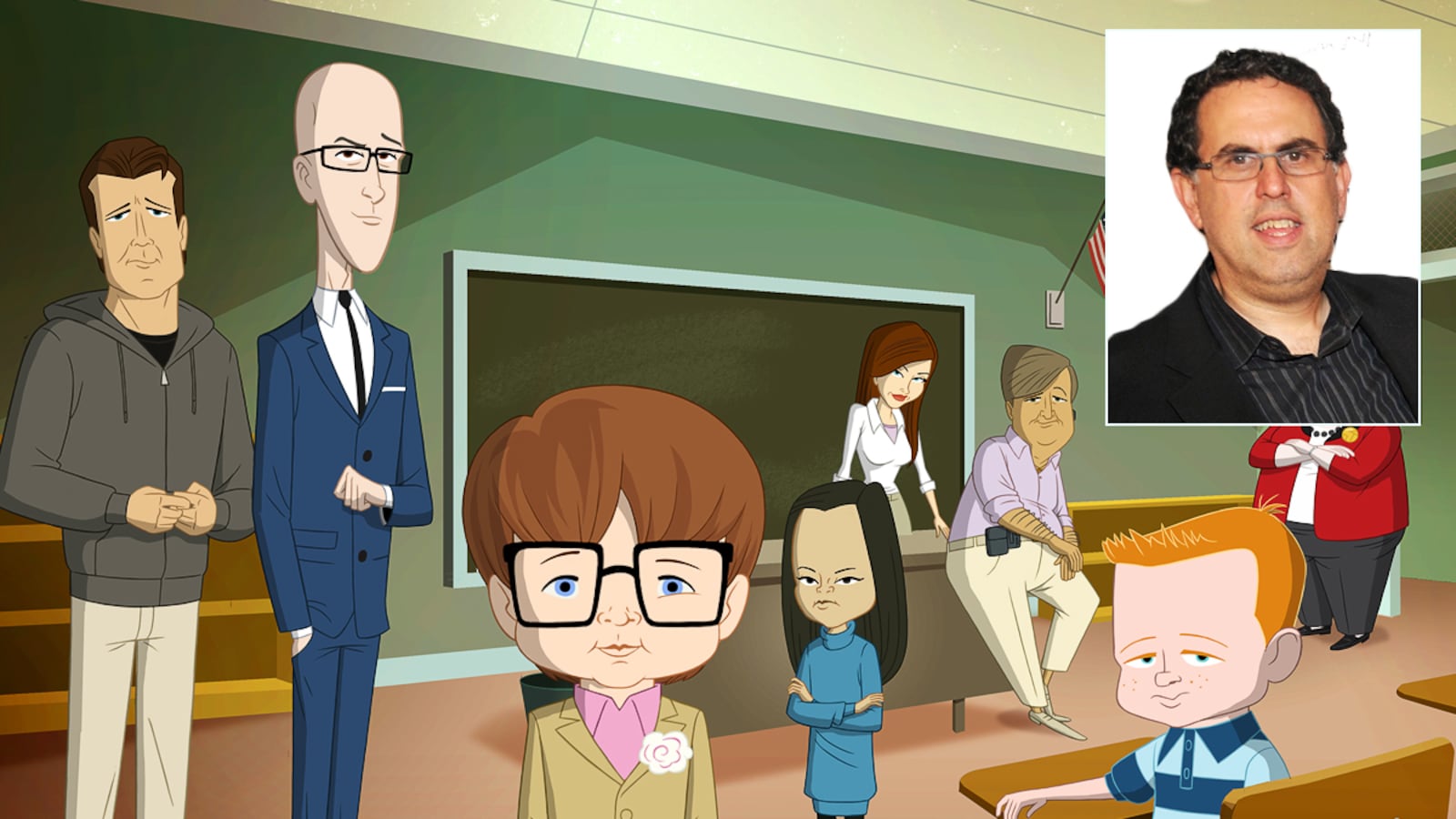As the showrunner of Allen Gregory, a new animated show from Fox premiering on Sunday night, I’ve watched with detached amusement as my colleagues on the show fret about our show’s chances of success. Will the audience like it? Will the network pick up more episodes? Fortunately for them, I’m something of a rock for them to lean on, a thick-around-the-middle Jewish oak tree they can hang on to in their hurricane of anxiety. Why so confident? Because I’ve been here before; I’ve been on the writing staffs of a dozen first-season television shows, and I know that there is nothing to worry about. Nothing at all. Here be the reasons:
We’re On After The Simpsons
This always guarantees success. America loves The Simpsons so much that love just spills over onto whatever fills the time slot after it. I know this from experience; I was a writer on an early example of a show to benefit from this cascade of affection. The year was 1990, and it was the most highly touted new comedy on the Fox network. You all remember it, a little game-changer called Babes, about three overweight sisters, Charlene, Darlene, and Marlene, who share an apartment in New York. (The theme song’s probably already running in your head: “Oh the ground just shook/And everywhere you look/All you see is BABES.”) What aren’t generally known in the fog of the show’s groundbreaking success were all the many bumps along the way before our launch. For starters, the premise of the show was of concern to several organized groups of overweight people; they didn’t want fatties to be the butt of the joke. The network immediately responded by telling the writers “no fat jokes.” We weren’t worried; we had great comedic stories with heart to rely on. One example: Darlene (the late Susan Peretz) is at an emotional crossroads and tracks down her hero, Buffalo Bob Smith from Howdy Doody, for advice. Even without fat jokes, the network was nervous about this story, but our showrunner, a passionate Howdy Doody fan since childhood, scheduled a meeting to personally pitch it to the network president, a very young and handsome Peter Chernin. The showrunner even showed up to the meeting wearing a vintage Howdy Doody Halloween mask. Chernin was impressed and said the showrunner was obviously very passionate about this story, and Chernin said he’d reconsider. And sure enough, the next day Chernin called and fired him. We got a new showrunner, who got the moratorium on fat jokes lifted and wrote a Thanksgiving episode with a dream sequence where Charlene (the late Wendie Jo Sperber) is attacked by giant food. Brilliant though he was, he got fired a few weeks later after going way over budget on the Club Med episode (special guest star the late Cesar Romero). Did all these problems matter one whit? No, sir. Babes went on after The Simpsons, and all was forgotten. Everything.

We’re Between Not One but Two Hits
We’re not just relying on our lead-in, because Allen Gregory is sandwiched between two gigantic hits, The Simpsons and Family Guy. So just as the enthusiasm for The Simpsons begins to fade, the pre-enthusiasm of Family Guy kicks in, and before you know it, America watched our show and doesn’t even remember it. This always works. An illustrative example from my career: in 1992, I was lucky enough to land a job on NBC’s highest-testing pilot, a show the network was so excited about they scheduled it between two comedy giants, A Different World and Cheers. I’m sure I don’t have to tell you the name of the show: Rhythm and Blues, the unforgettable story of Bobby Soul, a white DJ hired to save a struggling African-American radio station, WBLZ in Detroit. Playing Bobby was Roger Kabler, a very talented comedian and impressionist, who the network PR machine trumpeted as “the next Robin Williams.” Like Robin Williams, Kabler could do off-beat impressions of popular stars like … well, Robin Williams. NBC president Warren Littlefield told the writers to construct the episodes to allow Bobby to “detonate” with his impressions. Since the cast, with the exception of Roger, was African-American, the white showrunner, wanting the show to sound authentic, made sure that at least half the writing staff was also African-American. He would always seek out their advice, asking them questions like, “How would a black person say this?” and “Do black people celebrate Thanksgiving?” It was all going swimmingly until our premiere, when the show faced stiff competition from the new Fox sitcom Martin starring Martin Lawrence (which had the time slot after The Simpsons; see the previous paragraph). NBC didn’t give up; Littlefield himself proposed an attention-getting two-parter. At that time in the real world of radio, Howard Stern was beginning to “detonate” across the media landscape because of his frank exploration of controversial subjects. Littlefield suggested we do a two-part show where Howard Stern is going to be on the air in Detroit, and, to compete, the owner of WBLZ lets Bobby “detonate” on the air about a controversy. The job for the writers was to create a controversy for Bobby, since the subjects Howard Stern covered (e.g., anal sex, lesbians, tits) weren’t appropriate for network television. We solved this problem by having Bobby’s car damaged by potholes, and Bobby, comically enraged, gets on the air and rants about potholes (“I’m talkin’ about potholes!”), detonating insults to the city and the mayor using his impression of Robin Williams. Unfortunately the show was pulled off the air in October, before the two-parter was complete. NBC relaunched the show in February, but in a rare lack of confidence they moved the show’s time slot from Must-See Thursday to Not-Crucial-I-Watch Friday. The episode they led with, “Assault on Station BLZ,” about a disgruntled fan taking the station hostage on the air (co-written by me), was the lowest-rated episode in the history of NBC to that point, and Rhythm and Blues was immediately pulled from the air. It’s too bad, because the next episode had Bobby hired to be the human toy of an obnoxious rich kid in a wheelchair.
Pedigree Is Everything
Allen Gregory comes from great auspices. You have Jonah Hill, and his co-creators Jarrad Paul and Andy Mogel, who wrote The Yes Man starring Jim Carrey. Our producer is a not-quite-as-young-but-still-handsome Peter Chernin, and we’re all under the umbrella of 20th Century Fox, the studio responsible for every mega-hit in primetime animation. We have stunt casting of some major names in comedy, including Leslie Mann, Will Forte, and Jeff Goldblum. And there’s me, the former showrunner of Family Guy, as well as being a general good-luck charm. This is an iron-clad contract for success, just like another show I was on in 1991. A multicamera sitcom produced by Glen and Les Charles and James Burrows, who at the time were still guiding Cheers. This new sitcom’s lead was movie star David Keith from An Officer and a Gentleman (I think he played the Gentleman). Our director was Noam Pitlik, a multiple Emmy winner for shows like Barney Miller, and the production company was Paramount Studios, which was responsible for such mega-hit multicamera shows as Cheers, Wings, and Frasier. I’ve given you enough hints; you know I’m talking about Flesh ‘N Blood, in which Keith played charming white-trash conman Arlo Weed, who moves in with his long-lost sister Rachel, an assistant D.A. in Baltimore. Since he broke the law and she was the law … well, you get it. The show had some major stunt casting: Kirstie Alley (then the lead on Cheers) guest-starred in an episode as Arlo’s con-lady love interest. And Leslie Nielsen (between Naked Gun 1 and 2) guest-starred as Arlo’s conman mentor, who says he’s gone straight but in a rare twist in fact hasn’t gone straight. It all worked, except for the ratings. But it’s still a hit with the fan.
Make Sure You Get on the Air
I have learned from experience that no matter how good your show is, you may be in some difficulty if it doesn’t make it on the air. I remember one hit I was on that faced this problem: City High, which starred MC Hammer as an inner-city high-school teacher. The stories involved MC dispensing wisdom to these kids, but these kids, they didn’t always listen. For a variety of reasons that I’m sure had nothing to do with the quality of the show, it never made it on the air, depriving those kids, and America, of teacher MC’s wisdom.
But barring any last-minute disasters or unexpected firing of network presidents, we are going to make it on the air. That, and the rest of the factors I’ve listed lead me to feel very confident about Allen Gregory. So I want to say to my colleagues Jarrad, Andy, Jonah, there’s nothing to worry about. All we can do is focus on the work and try to produce the best show possible. Sage advice, passed on to me by the showrunner of Pig Sty (UPN, 1993, five hot guys share an apartment in a building managed by a hot female super).






